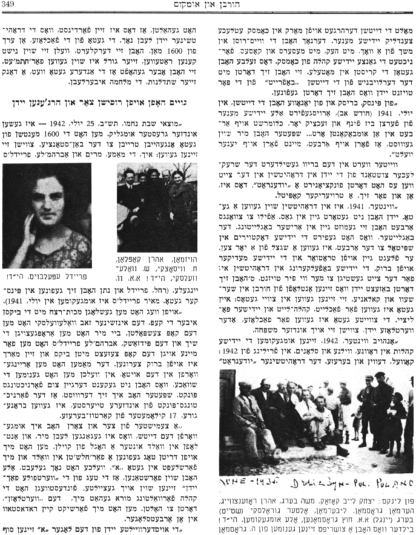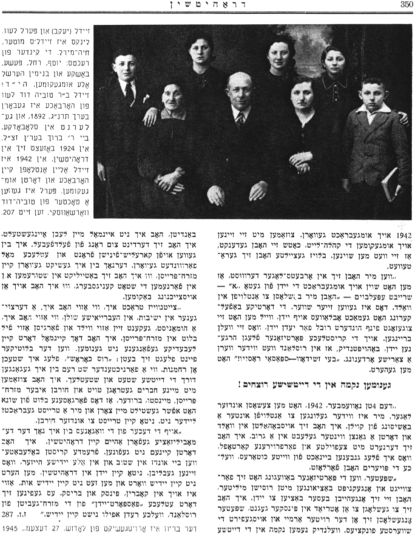
[Page 349]
Germans then killed a few dozen Jewish men at the market in Khomsk. Thereafter, within a week, the White Russians used knives, scythes and axes to kill the entire Jewish community of Khomsk. The Christians did the same thing in Motele. They had permission from the Germans to get rid of the couple of thousand Jews who lived there.
“From Pinsk, Brisk and Yanova the Germans supposedly took Jewish men from fourteen to sixty five to perform forced labor at an unknown location in July 1941. Later, we found out that traveling to work meant leaving for the next world.”
Shmuel continued his description of the dreadful situation of the Jews in Drohitchin during the time the Judenrat operated. This is a chapter in and of itself.
“In the winter of 1941 a ghetto was established in Drohitchin. Jews did not dare go onto the street, and even when they went to forced labor, they were escorted by Aryans. The escort who took Jewish doctors to work in the hospital was a mere ten year-old boy. He would walk on the sidewalk, and the Jewish doctors would walk in the street. The Jewish population in Drohitchin numbered more than four thousand. There were some Jews who had escaped the destruction of Shershev and Kolonia. There were two ghettos in Drohitchin: one ghetto for tradesmen, community people and Jewish police; the other ghetto was for those without a trade or “worthless” Jews, which included our family.
[photo:] From left: Yitzchak Leib Kosack, Moshe Berg, Aharon Rosenzweig, Herman Grossman, Lieberman, Alter Goralsky (standing), Berg (child) and others. Except for Grossman, everyone perished. May G-d avenge their blood! Photos that are distributed are from H. Grossman.
“In the beginning of the winter of 1942, the Jewish communities of Rovno, Vilna and Slonim were destroyed; in the spring of 1942, Kovel, Devin and Bereza. The Drohitchin Judenrat believed that it was because of them that the Jews of Drohitchin were still alive. They then stated that they could not save the ghetto of the unskilled Jews, who numbered some 1,600 people, and that their fate was already sealed. However, they hope that through their efforts, the other ghetto would survive the war.
Gentiles awaited the restoration of the Russian monarchy and killed Jews
“On the evening of Saturday, July 25, 1942, we experienced our greatest misfortune. The 1,600 people in the ghetto were taken away to the train station. They included my mother, Miriam and Avrahamele, Freidel's child (Rachel, Freidel and Natan were in the Pinsk ghetto. Meir Freidels perished in July 1941) and me.
“Along the way, people were struck viciously over the head with guns. Zev Valevelsky the engineer had his head split open. In my case, they took my shoes and jacket. Avrahamele Freidels was struck over the head with a gun, and his brains were spilled onto the street. Mother was pushed inside the car where they put the weak who could not make it to the annihilation location. Later, I found out that the place our loved ones were killed was in Brona-Gora, 17 kilometers from Kartuz-Bereza.
“ I was filled with suffering and wrath when I pushed down the German who was walking next to me, and I ran off into the forest under a hail of bullets. On the third day they found me after having fainted in the forest, and took me to Ghetto A, which still existed. Everyone realized that the days of the “worthwhile” Jews were numbered too. Suddenly the community administration was scared to keep me, one of the “worthless” ones, so I was send to Radostov to a labor camp.
[photo:] Hausman, Aharon Kaplan, H. Wisotsky, S. Valevelsky. May G-d avenge their blood, and others

[Page 350]
“The lucky Jews of Camp A [sic] also perished at the end of 1942. The community leaders perished together with them, even though they thought that they would survive. Only a few managed to survive.
JewishGen, Inc. makes no representations regarding the accuracy of
the translation. The reader may wish to refer to the original material
for verification.
Copyright © 1999-2026 by JewishGen, Inc.
“When we found out in the labor camp that the Jews in Ghetto A perished as well,” writes Eppelbaum, “we decided to flee to the forest. It was very difficult. The local population was attacking the Jews because they were promised five hundred rubles for every Jew they turned in. The Christian partisans would also kill Jews, claiming that the Russian monarchy would be restored. They would cry out, “Kill the Jews, Save Russia!”
Taking revenge on the Germans
“On November 4, 1942, our camp was shot at. I was able to escape under a hail of bullets. I hid out in the forest, and lived there in a pit for the entire summer. I lived off of rotten and frozen potatoes that I stole from faraway hamlets that were left over by the peasants.
“Later, when the partisan movement branched off and separated from the Russian army, they preferred working with Jews. I joined the unit in the Pinsk region, and later joined the Red Army, where I carried out the most difficult tasks hoping to take revenge on the German bandits. More than once I risked my life, and attained the rank of sergeant. I was at the Karel-Finnish front, and was wounded several times. Therafter, I was sent to eastern Prussia, where I participated in attacks and capturing the city of Königsberg, where I received an award.
“Sometimes I wonder how I, someone who was educated in yeshivas and Hebrew schools, and was a humanist, was able to could have been so wild and could have shed so much blood in eastern Prussia. I did not take any live prisoners. When the bloody hatred would say “Russian, good,” I would slaughter them mercilessly. I went through the German towns and cities like a wild storm. My friends and I took death and destruction through eastern Prussia. Brothers, you may think that shedding the blood of the enemy might have calmed my rage consoled me. Unfortunately, it did not. There is no consolation for our suffering.
“After the demobilization I returned home to Drohitchin on the roofs of wagons. I found no one there. I found unknown gentiles taking over our home and all Jewish homes that remained standing. There were no Jews in Drohitchin, no Yiddish to hear or see. This was the same in Kobrin, Pinsk and Brisk. There were a few “passport Jews” from the eastern regions of Russian who did not even speak any Yiddish.” See pp. 287.
The letter was sent from Lodz on December 27, 1945
[photo:] Zeidel (Yaakov) and Perl Lev. On the left is Zeidel's mother, Chaya-Mirel. The children from right to left are: Yosef, Rachel, Pesha, Bashka and Binyamin Hershel. They all perished. May G-d avenge their blood! Zeidel, the son of Tuvia David [sic] Lev from Horbacha was born around 1892 and studied in the Slobodka yeshiva under R. Baruch Ber Levovitz. In 1924 he moved to Drohitchin, and in 1942 Zeidel fled to Horbacha and perished there. Perl was a daughter of Tuvia David [sic] Warshavsky.
Previous Page |
Next Page
fulfilling our
mission of disseminating information about the Holocaust and
destroyed Jewish communities.
This material may not be copied,
sold or bartered without JewishGen, Inc.'s permission. Rights may be
reserved by the copyright holder.
JewishGen is not responsible for inaccuracies or omissions in the original work and cannot rewrite or edit the text to correct inaccuracies and/or omissions.
Our mission is to produce a translation of the original work and we cannot verify the accuracy of statements or alter facts cited.
 Drogichin, Belarus
Drogichin, Belarus
 Yizkor Book Project
Yizkor Book Project
 JewishGen Home Page
JewishGen Home Page
Yizkor Book Director, Lance Ackerfeld
This web page created by Lance Ackerfeld
Updated 4 Dec 2001 by LA